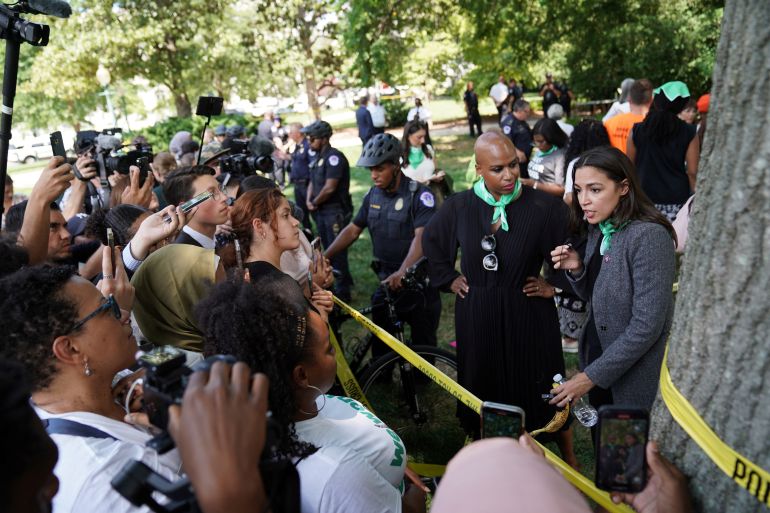Omar, AOC among US lawmakers held at pro-abortion rights rally
The US Capitol police say demonstrators blocked traffic on a nearby road and were given three warnings before officers made the arrests.

At least 17 Democratic lawmakers, including Ilhan Omar, Rashida Tlaib and Alexandria Ocasio-Cortez, have been arrested at an abortion rights protest outside the United States Supreme Court, amid increasing anger over the controversial overturning of Roe v Wade last month.
The US Capitol police said on Twitter that the demonstrators had blocked traffic on a nearby road and were given three warnings before officers made the arrests.
Keep reading
list of 3 itemsJudge blocks enforcement of pre-Roe abortion ban in West Virginia
US House votes to restore abortion rights after end of Roe
“We made a total of 35 arrests for Crowding, Obstructing or Incommoding,” the police said. “That arrest number includes 17 Members of Congress.”
Correction: We made a total of 35 arrests for Crowding, Obstructing or Incommoding (DC Code § 22–1307).
That arrest number includes 17 Members of Congress.
— U.S. Capitol Police (@CapitolPolice) July 19, 2022
The small demonstration came weeks after a ruling by the Supreme Court that overturned the 1973 landmark Roe v Wade decision, which had guaranteed women’s access to abortion.
“Today I was arrested while participating in a civil disobedience action with my fellow Members of Congress outside the Supreme Court,” Omar, representative from Minnesota, said on Twitter.
“I will continue to do everything in my power to raise the alarm about the assault on our reproductive rights!” she tweeted.
Representative Carolyn Maloney of New York was also arrested. She issued a statement saying, “There is no democracy if women do not have control over their own bodies and decisions about their own health, including reproductive care.”
“The Republican Party and the right-wing extremists behind this decision are not pro-life, but pro-controlling the bodies of women, girls, and any person who can become pregnant.”
Footage from the protest showed Ocasio-Cortez, Omar and others being led away, not in handcuffs, and waving to supporters.
On Friday, the US House of Representatives voted to restore abortion rights across the country, passing the bill with 219 votes in favour and 210 against, but it has little chance of becoming law because it lacks the necessary support in the evenly divided Senate.
The US Supreme Court’s decision to overturn Roe v Wade has been welcomed by conservatives but spurred anger among human rights advocates who said it will disproportionately affect Black and low-income people.
Twenty-six US states are likely or certain to ban abortion after the fall of Roe v Wade, according to the Guttmacher Institute, a reproductive rights group.
Already, several Republican-controlled states have moved to severely restrict or ban abortion, while Democratic state leaders have sought to shore up protections, including for out-of-state pregnant patients travelling for abortion services.
The House on Friday also passed a separate bill to prohibit punishment for a woman or child who decides to travel to another state to get an abortion.